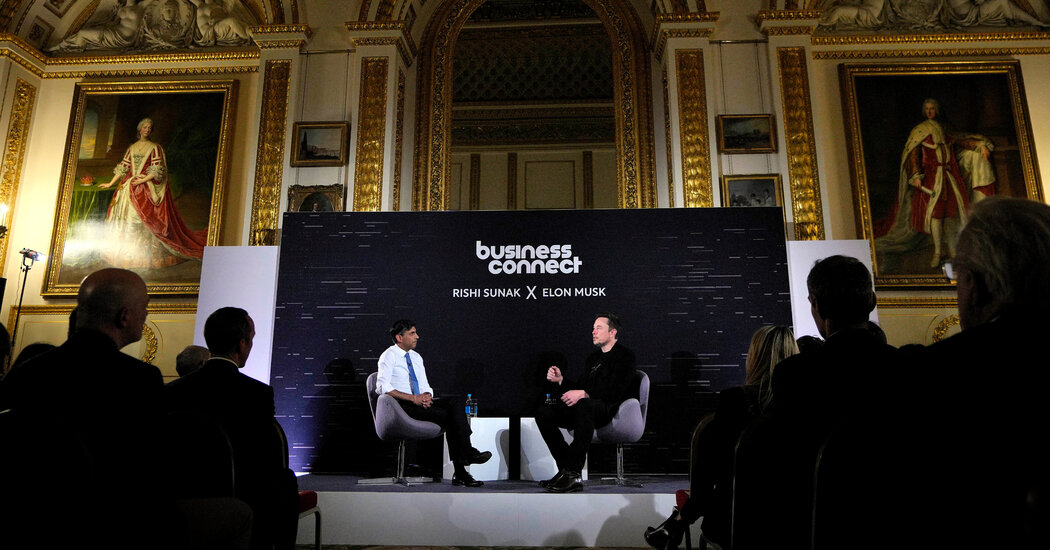
The prime minister’s conversation with the tech billionaire was part of an effort this week to present Britain as a leader in artificial intelligence.
Rishi Sunak, the prime minister of Britain, had one last appointment on Thursday evening after a busy couple of days hosting dozens of government leaders, tech executives and other experts at a summit on the dangers of artificial intelligence: a sit-down with Elon Musk.
Mr. Musk, the omnipresent tech billionaire, was in town for the A.I. Safety Summit that Mr. Sunak had organized at Bletchley Park, the countryside estate where Alan Turing helped crack the Enigma code used by the Nazis during World War II.
Public officials including Vice President Kamala Harris and António Guterres, the secretary general of the United Nations, attended the summit, as did tech leaders like Sam Altman, the head of OpenAI; and Reid Hoffman, the investor and co-founder of LinkedIn.
But only Mr. Musk, a man with growing geopolitical influence through his control of X, Tesla and SpaceX, was given such special treatment by the British prime minister.
At Lancaster House, a former royal residence near Hyde Park and Buckingham Palace, Mr. Sunak interviewed Mr. Musk about the potential dangers of A.I. and, what, if anything, the world can do to prepare itself. The discussion was streamed on X, Mr. Musk’s social media platform formerly known as Twitter.
“A.I. will be a force for good, most likely,” said Mr. Musk. The problem, he said, is that the chance of things going very badly is “not zero.” Artificial intelligence is developing “faster than any technology I’ve seen in history by far,” he added.
Mr. Sunak said he believed A.I. posed many risks, but downplayed some of the potential negative effects. While he encounters many voters worried about automation and job losses, Mr. Sunak said he believed A.I. would improve productivity, create jobs and serve as a “co-pilot” to help workers rather than replace them — a view not shared by many labor unions.
The two men are an odd pairing. Mr. Sunak is a buttoned-up former Goldman Sachs banker whose greatest political attribute in becoming prime minister was that he would be a steady pair of hands after the ramshackle leadership of his predecessors Boris Johnson and Liz Truss. By contrast, Mr. Musk, known for predawn social media posts and deliberately provocative statements, appears to thrive more in a state of improvisation and chaos.
What both have in common is that they have been under intense scrutiny.
Mr. Sunak’s hold on power is in doubt. His Conservative Party, which must call an election by January 2025, has governed for 13 years and is being held responsible for a stagnant economy, worker strikes and public services under strain after years of government cuts. Mr. Musk has faced criticism for, among other things, allowing racist, antisemitic and hateful speech to thrive on X since he bought the platform last year.
Mr. Sunak, who attended Stanford University and has spoken fondly of his time in Silicon Valley, tried to use the event at Bletchley Park to position Britain as a global leader on A.I. The event produced little in terms of concrete policy, but many in attendance said it kick-started a global conversation about the need to safeguard A.I.
Mr. Musk was perhaps the biggest name in attendance. On Wednesday, he participated in several closed-doors sessions and posed for photos.
“People would come up to say, ‘Can I just take a selfie?’ Then really quickly somebody else would say, ‘Oh, can I get one, too,’” said Max Tegmark, a professor at the Massachusetts Institute of Technology, who attended the event and has known Mr. Musk for years.
Mr. Sunak appeared to be equally taken by Mr. Musk. He opened the conversation with an admiring quote from Bill Gates about Mr. Musk’s being one of his generation’s great inventors.
“What are the types of things governments like ours should be doing?” Mr. Sunak asked deferentially at one point.
In the audience were a mix of British officials and business executives, including Demis Hassabis, the chief executive of Google’s A.I. lab DeepMind. The musical artist Will.i.am sat in the front row.
Some saw Mr. Sunak’s conversation with Mr. Musk as a not-so-subtle attempt to raise Britain’s standing with entrepreneurs and tech companies at a time when the country’s economy is languishing. At a news conference earlier on Thursday, a British journalist asked Mr. Sunak if the meeting was about A.I. or trying to lure a Tesla battery plant to Britain. (Mr. Sunak praised Mr. Musk’s expertise about A.I.)
“He wants the U.K. to attract investments,” said Marietje Schaake, the international policy director at Stanford’s Cyber Policy Center, who moderated one of the discussions at the A.I. Safety Summit. The Musk interview, she said, “looks a bit like a media stunt.”
Mr. Sunak’s conversation with Mr. Musk veered, at times, toward science fiction. Mr. Musk outlined a future in which computers would surpass human intelligence and people would not have to work. At another point, he discussed the creation of humanoid robots that would need off switches.
In an unexpected heartfelt moment, Mr. Musk said A.I. systems could become so advanced that it could be a person’s “great friend” by remembering conversations and learning their likes and dislikes. He noted that his son has learning disabilities and trouble making friends. “An A.I. friend would be great for him,” he said.
